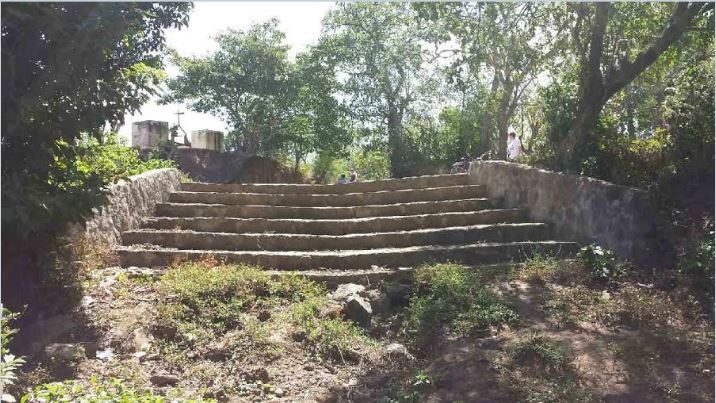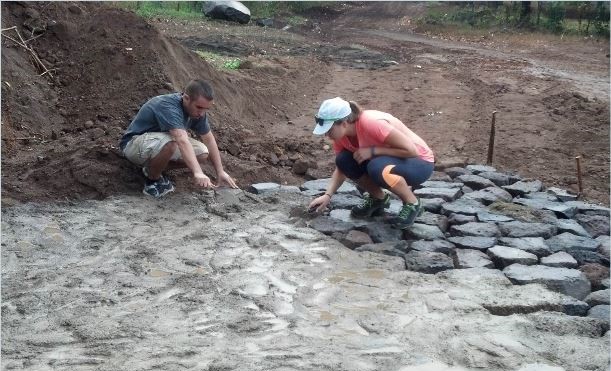The following is an abstract of EWB-UConn’s official project. This project was closed in 2016.
Heavy rainfall during the rainy season causes severe erosion to the Path of La Prusia making it extremely difficult to traverse.This problem directly affects 200 families by making it difficult for emergency vehicles to access them in times of emergencies, as well as simple day to day activities such as obtaining food or going to work.
EWB-UConn found a way to help as they implemented a swale structure made of volcanic rock aggregate and concrete to divert heavy rain water off of the path.
Following initial construction, the municipality of Granada implemented a step design for energy dissipation to reduce the effects of scour. In addition, two wing walls were constructed to divert water into the swale at the inlet.
The final results of the construction were both aesthetically pleasing and effective. The swale effectively diverts water off of the Path of La Prusia and has minimal unintended consequences.


The UConn chapter of EWB targeted the impoverished shantytown of La Prusia, Nicaragua for its aid efforts, with the aim of improving living conditions for residents through the construction of a permanent road linking La Prusia with the colonial city of Granada.
Nicaragua is recognized as perhaps the second poorest country in the Americas, with 48% of the population living below the poverty line. La Prusia is an intensely poor community of squatters, most of whom survive on less than $1/day and reside in houses built from wooden slats with corrugated metal roofs. Most residents lack access to basic facilities, including indoor plumbing and reliable, potable water supplies.
UConn EWB became involved in the project in late 2007. The group’s core focus involved redesign, stabilization and construction of a permanent road over the existing unpaved road. The region’s intense rainy “invierno” season brings torrential floods that chronically wash out the dirt road, producing ditches and gullies up to 8 feet deep in some areas, rendering the road impassable to motor vehicles.
Impact on two Communities
Chronically impassable, the road’s condition hampered traffic from the city and prevented residents from traveling to Granada where they would have access to:
Jobs
Hospital care
Markets for their products
Higher education
Trash collection and other services
The citizens of Granada are not immune to the effects of this condition. Separated from the city and desperately poor, La Prusia’s troubles sometimes spill over into Granada, which experiences higher crime near the city’s borders. Granada’s civic leaders and law enforcement officers fully support efforts to improve life in La Prusia and to make permanent road improvements. They believe the road project will help to integrate the shantytown into city life, providing an economic and social lifeline.
The Project
UConn EWB planned to facilitate the redesign, structural stabilization and paving of the road using indigenous construction methods and materials as well as local labor. The standard technique involved three steps. First, a foundation is applied atop the dirt, made from an aggregate containing soil and volcanic rock. Along the margins, roadways are buttressed up and stabilized by quarried stones fitted together. Brick pavers are laid atop the aggregate foundation. Butler said road construction is expensive, mostly due to the high cost of materials and fuel to run the heavy construction equipment.
UConn EWB in La Prusia
Members of the UConn EWB made four trips to the region to understand the scope of the project, conduct site surveys and meet with key stakeholders in both La Prusia and Granada. The team’s activities to date have included:
Meeting with officials from Casas de la Esperanza, the NGO operating in the area; community leaders; the U.S. Ambassador to Nicaragua; and Granada’s Mayor, Chief Engineer and Public Affairs Officer
Signing an official document outlining the city’s relationship with EWB
Surveying approximately 25% of La Prusia residents to gauge the community’s needs and opinions relative to the road project
Conducting a detailed topographic survey of a 1.8 kilometer section of the road, collecting data that will be fed into a CAD program in Storrs
Collecting on-the-ground data for watershed analyses, to be combined with satellite data of water resources in the region.
Beginning fundraising efforts to gather the estimated $30,000/year needed to stabilize and pave the road
Assembled a Board of Professional Advisors (UConn alumni, representatives of donor companies, faculty members) to counsel the chapter
Implementation
Engineers Without Borders -- UConn has a developed a cheaper alternative to this problem.
Connect two already existing, naturally made trenches that run along the side of the road
Lay brick on the road to divert the water off the road and into the trench.
Third trip from January 5th-16th of 2014
Three members and a professional engineer traveled to the path of La Prusia to implement the design and project that would diminish the effects of erosion on the path due to the intense rainy season that occurs for approximately 6 months of the year. Both the location of the proposed design location as well as the dimensions and grades were deviated from their original location and dimensions, however the project was moved up the path where the city engineer and community saw it be more effective at diverting the water.
Fourth trip from January 6th-10th of 2015
Four members and a professional engineer traveled back to the path of La Prusia to monitor and evaluate the project after a year of its implementation. The travel team assessed the project as well as asked officials and the community on the effectiveness of the project and all agreed that the project had greatly increased the mobility along the path during the rainy season. The project was closed out in the Spring of 2015, being both effective and sustainable.
Larger Aid Project
The team is collaborating with a Massachusetts-based nonprofit NGO, Casas de la Esperanza, which operates in La Prusia. The organization, run by volunteers, helps residents build their own houses and develop economically and socially. The group offers direct support, courses and technical education, small business and cooperatives, thereby increasing their expectation of a better future.
Sponsors
GEI Consultants, Inc., a geotechnical, water resources, environmental and ecological consulting firm generously sponsored the summer 2010 UConn EWB trip to Nicaragua.
Civil & Environmental Engineering Department – donated new, top-of-the-line surveying and rainfall measuring equipment.
Special thanks to Gerald Hardisty, P.E. for his continuous work overseeing the project from start to finish.